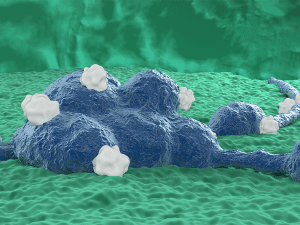New Drug Aims to Prevent Neuroblastoma Relapse
The FDA has approved eflornithine to prevent relapse after standard-of-care therapy for neuroblastoma.
The U.S. Food and Drug Administration (FDA) has approved eflornithine (Iwilfin) to reduce the risk of relapse in adult and pediatric patients with high-risk neuroblastoma whose tumors have responded to previous multiagent, multimodality therapy regimens that included immunotherapy targeting GD2.
Eflornithine is a small molecule inhibitor of the enzyme ornithine decarboxylase, which helps produce molecules called polyamines that are important for cell growth. While other formulations of eflornithine have been used to decrease unwanted hair growth and treat the sleeping sickness trypanosomiasis, this is the first FDA approval of eflornithine for cancer. It is also the first treatment approved for the prevention of neuroblastoma relapse in children.

The approval was based on results from an externally controlled trial; the control arm was composed of patients from Study ANBL0032, a phase III clinical trial assessing the efficacy of a therapy regimen that attacks the cancer using several different mechanisms (called multimodality therapy). Patients in the control arm were treated with isotretinoin, dinutuximab (Unituxin, an anti-GD2 therapy), aldesleukin (Proleukin), and sargramostim (Leukine).
The researchers designed the investigational arm of their trial—the multicenter, open-label, nonrandomized phase II Study 3b—to compare patient outcomes to those observed in Study ANBL0032. The study enrolled patients 21 years of age or younger whose disease was in remission after standard-of-care multimodality therapy containing an anti-GD2 immunotherapy. Patients were given eflornithine until disease progression, unacceptable toxicity, or a maximum of two years.
The cohort for the primary analysis consisted of 90 patients from the investigational arm and 270 matched patients from the control arm. Patients in the investigational arm were 52% less likely to experience disease progression, relapse, secondary cancer, or death due to any cause. An analysis focused on death rates found that those in the investigational arm were 68% less likely to die of any cause than patients in the control arm.
Neuroblastoma is a rare but aggressive tumor that predominantly occurs in early childhood and affects nerve tissue found throughout the body. Approximately 650 children in the United States are diagnosed with neuroblastoma each year. Neuroblastoma in adults is extremely rare, with some studies estimating that only 6% of neuroblastomas are diagnosed in adulthood.
The FDA rendered its decision on December 13, 2023.
